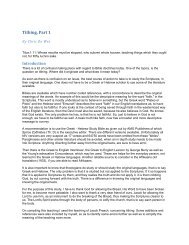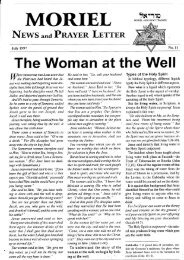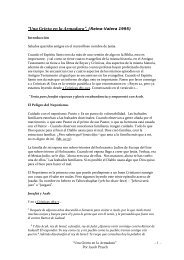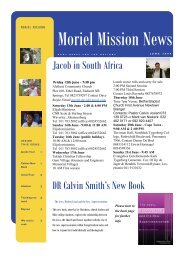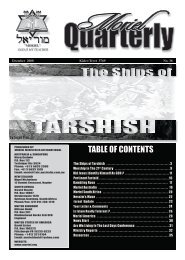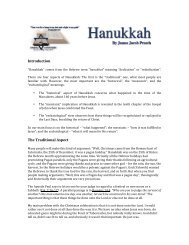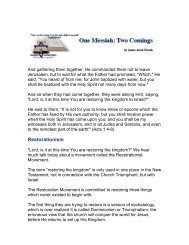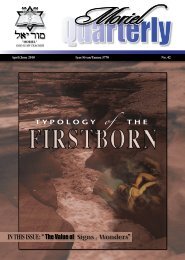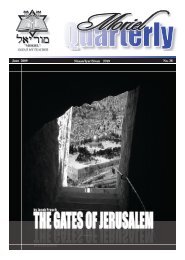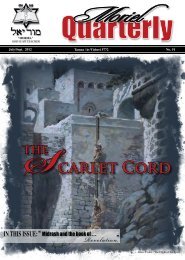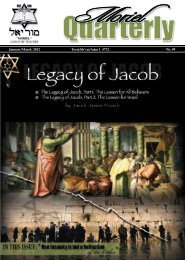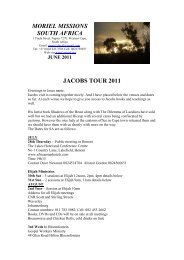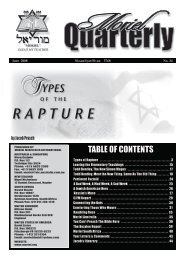Spiritual Warfare and Territorial Spirits (~5.5 MB) - Moriel Ministries
Spiritual Warfare and Territorial Spirits (~5.5 MB) - Moriel Ministries
Spiritual Warfare and Territorial Spirits (~5.5 MB) - Moriel Ministries
You also want an ePaper? Increase the reach of your titles
YUMPU automatically turns print PDFs into web optimized ePapers that Google loves.
Continued : <strong>Moriel</strong> South Africahis descendant’s came out of Egypt whenthe wicked king was judged; then anotherwicked king was judged <strong>and</strong> the Messiahcame out of Egypt. There are multiple fulfilment’sof prophecy. Midrashically, “Israel”alludes to Yeshua (Jesus) the Messiah.When you see verses like: “Israelmy glory <strong>and</strong> Israel my first born,” theyare midrashic allusions to the Messiah.Then, in 1 Corinthians 10, somethingelse happens: We come out of Egypt,which Paul tells us is a symbol of theworld. Pharaoh, who was deified by theEgyptians <strong>and</strong> worshipped as God, is asymbol of the devil, the god of this world.Just as Moses made a covenant with blood<strong>and</strong> sprinkled it on the people, so did Jesus.Moses fasted forty days, <strong>and</strong> so didJesus. Jesus is the prophet like Moses, predictedin Deuteronomy 18:18. Just as Mosesled the children of Israel out of Egypt,through the water, into the Promised L<strong>and</strong>,so Jesus leads us out of the world, throughbaptism, into heaven. It is a pattern.Then the horse <strong>and</strong> its rider arethrown into the sea (Exodus 15:1). Wesing the song of Moses — the horse <strong>and</strong>rider thrown into the sea — in Revelation15:3. Why? Because it is a pattern.The ultimate meaning of “coming out ofEgypt” is the resurrection <strong>and</strong> rapture ofthe Church. The judgments that happen inExodus are replayed in Revelation. Andjust as Pharaoh’s magicians were ableto counterfeit the miracles of Moses <strong>and</strong>Aaron, so the antichrist <strong>and</strong> False Prophetwill counterfeit the miracles of Jesus <strong>and</strong>His witnesses. They brought Joseph’sbones with them when they came out ofEgypt (Exodus 13:19). Why? Because thedead in Christ will rise first. It is a patternThe ancient Jewish mind that producedthe New Testament looks at prophecy,not as prediction, but as pattern.To underst<strong>and</strong> what is going to happenin the future, you look at what did happenin the past. There are multiple fulfilments,<strong>and</strong> each successive fulfilmentteaches something about the ultimate one.You will never underst<strong>and</strong> the Bookof Revelation with the kind of limitedapproach to biblical interpretation that istaught in Protestant seminaries. Midrashis like a quadratic equation or a verycomplex second order differential equation,a thirteen or fourteen step equation.Some people take the first step of grammatical-historicalexegesis <strong>and</strong> thinkthe equation is solved. There is nothingwrong with what they do, but there isplenty wrong with what they don’t do.The equation is not solved. There is nothingwrong with grammatical-historicalexegesis. It is a necessary first step, it is36 <strong>Moriel</strong> Quarterly • June 2007a necessary preliminary, <strong>and</strong> it is okayfor reading the Epistles. But that is all.It takes the wisdom of the ancientsto really underst<strong>and</strong> these things — Lethim that hath underst<strong>and</strong>ing count thenumber of the beast... (Revelation 13:18)— not the wisdom of the 16th century,but the wisdom of the first century.FellowshipHaving recently spoken in Sydneyon this subject matter, I decidedto transcribe it in three parts in caseany of our readers find it edifying.TRUE FELLOWSHIPActs 2: 42 – 47“And they continued stedfastly in theapostles’ teaching <strong>and</strong> fellowship, in thebreaking of bread <strong>and</strong> the prayers. Andfear came upon every soul: <strong>and</strong> manywonders <strong>and</strong> signs were done through theapostles. And all that believed were together,<strong>and</strong> had all things common; <strong>and</strong>they sold their possessions <strong>and</strong> goods,<strong>and</strong> parted them to all, according as anyman had need. And day by day, continuingstedfastly with one accord in the temple,<strong>and</strong> breaking bread at home, they tooktheir food with gladness <strong>and</strong> singlenessof heart, praising God, <strong>and</strong> having favorwith all the people. And the Lord added tothem day by day those that were saved.”I was speaking to someone a whileago, <strong>and</strong> they were reminiscing abouta church many years back. They saidthat at this particular church the fellowshipwas sweet like nothing they haveexperienced before or since. In fact overthe last few years, I’ve spoken to quite afew people who have told me the samething. In fact I, myself, as a youth leaderin the late 70’s, early 80’s, have memorieswhich are so sweet; of fellowshipwith the crowd I was involved with then.So is fellowship consigned to thepast? Does it only exist in the nostalgicmemories of a few? Or is there a possibilitythat fellowship can be lived <strong>and</strong>experienced among believers today? Despitewhat we see so often in our churches,despite the apparent shallowness ofsome of our relationships, I believe fellowshipis a distinct possibility for you<strong>and</strong> I, if we endeavor to do two things.Firstly – We fellowship tothe depth <strong>and</strong> breadth which theNew <strong>and</strong> Old Testaments indicate.Secondly – We see fellowship aswhat it really is; something which needsto be constantly worked at. I don’t knowabout you but I carry baggage that hindersmy fellowship; stuff that I need tolet go of if I desire to grow in this area.The text we are looking at is probablythe text that most people wouldcome up with when thinking about NewTestament fellowship <strong>and</strong> that’s why Ichose it. For here we see a group of believerswho shared everything together inthose early days straight after Pentecost.But today I am not going to exegete thattext fully because when one looks at theoriginal Greek <strong>and</strong> Hebrew texts concerningthe whole area of fellowship, webegin to see a lot deeper into what Goddesires for us. For example, the word‘fellow’ in the Hebrew has four uses.• It can just mean man or ‘ish’. ‘Isha’ is thefeminine for woman. It’s a generic term.• Another is ‘Reya’, an associate, an acquaintance.• Another is ‘Amiyth’, which means acomrade, a closer word than ‘Reya’.• And finally there is ‘Kawbare’, whichliterally means ‘to be knitted together’or intermeshed.When we look at the Greek we get aneven more in depth look, because it suggestswhat we must do or be with our fellows.• In Ephesians 2: 19, it says we must be‘fellow citizens’ or ‘Soompolytare’. In otherwords a native of the same town or faith.• In John 11: 16, we are called ‘fellowdisciples’ or ‘Soomathetes’. In other wordsa co-learner under the same master.• In Ephesians 3: 6, Paul says we are ‘fellowheirs’ in Christ, in other words we participatein a common inheritance. ‘Soongklayronomos’.We are also fellow membersof the body, fellow partakers of the promise.• In 1 Thessalonians 3: 2, we are called‘fellow laborers’, or ‘helpers’. It’s thesame Greek word ‘Soonergos’, a companionin labor.• In Romans 16: 7, we are called ‘fellowprisoners’, ‘Soonaheekmalotos’,a co-capture in Christ or for Christ.• In Colossians 1: 7, we are to befound as fellow servants, ‘Soondoulos’,co ministers with the same Master.• Then in Philemon verse 2, theword suggests ‘fellow soldier’, ‘Soostiateotare’,a companion in battle.So when we look just at the depth inthe way scripture suggests how you <strong>and</strong> Iare to interrelate in Christ, we see that evenhere, sometimes what we know as ‘church’pales into insignificance. But there is onemore ‘fellow’ which even makes thesefall short of what I believe God reallydesires <strong>and</strong> that ‘fellow’ is ‘fellow-ship’.In the Hebrew we have several words;The first is, ‘Tesoometh’ or to bepledged together.Secondly we have ‘Yad’which means an ‘open h<strong>and</strong>’ quite liter-




